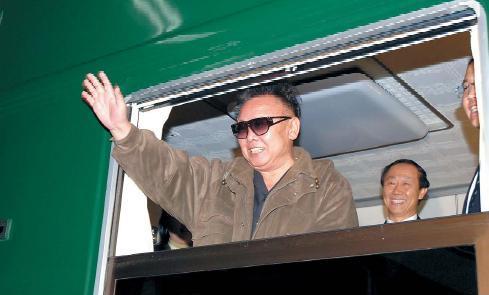North Korean leader Kim Jong-il’s rare visit to China sparked mixed speculations on what Pyongyang aims to achieve through his meeting with Chinese President Hu Jintao.
The dominant thought was that Kim would request economic assistance from North Korea’s biggest patron, possibly in return for coming back to the multilateral talks aimed at ending Pyongyang’s nuclear weapons programs.

Some, however, predicted that Kim may be seeking to talk things over with China over growing suspicion from Seoul that the North masterminded the sinking of a South Korean warship in late March.
Seoul has launched an investigation to get to the bottom of the sudden explosion on the night of March 26 that left 46 sailors dead or missing.
“It would be politically and diplomatically difficult to get into a discussion on the Cheonan, both for the North and China,” said Baek Seung-joo, a North Korean specialist at the Korea Institute for Defense Analyses.
China has traditionally been a close ally to North Korea, but it also is chair of the stalled six-way talks that the North has been boycotting since April last year.
China also has the South Korean government to consider, especially since it was just last week that Hu met with President Lee Myung-bak to discuss urgent regional issues that no doubt included North Korea.
Pyongyang currently denies its involvement in the Cheonan’s sinking, but a large number of experts here -- including government officials such as the defense minister -- believe the North was seeking revenge for a defeat it suffered in November last year during another inter-Korean naval battle.
The official stance of Seoul and its presidential office of Cheong Wa Dae is that the investigation results would be necessary in defining South Korea’s next step in its relations with the North and possibly China as well.
“The North’s top priority for the visit to China at this time is what kind of economic benefits or assistance it can receive,” Baek said.
China may be ready to offer such help, others said, as Beijing fears a destabilization of the North that would inevitably have an impact on China.
Pyongyang has been seen to be suffering from an ongoing economic hardship that was reportedly exacerbated by a United Nations Security Council resolution last year calling for stronger economic sanctions on the North for its second nuclear test.
Kim’s currency reform late last year appears to have further weighed on the economy, leading to frequent reports here of unrest among the North Korean public.
If Kim does mention his regime’s willingness to return to the six-way dialogue, experts said it could lead to another round of discussions.
North Korea said it would “permanently” quit the talks after the U.N. criticized its rocket launch in April last year as an attempt to test missile capacity. In May, Pyongyang conducted its second nuclear test.
Since the Cheonan’s sinking, the South Korean government had been critical about the prospects of the revival of the multilateral denuclearization talks.
Foreign Minister Yu Myung-hwan yesterday told The Korea Herald that under the current circumstances “it seems like it would be difficult to resume the talks just now” even if the North and China discuss the six-party talks.
He added, however, that the decision would have to be coordinated with other members of the talks -- the U.S., Japan and Russia.
Kim Jong-il had been expected to visit China since January this year, following a series of visits by high-profile political figures from Beijing including Prime Minister Wen Jiabao.
Kim reportedly communicated to Wen at the time of his willingness to return to the six-way talks. In December last year, Washington sent its chief envoy to the North to discuss the prospects of another round of talks, but the North has yet to confirm when it would come back.
Pyongyang also set down a number of conditions for the restart of the talks, such as that the U.S. should seek to replace the Armistice Agreement with a permanent peace regime before discussing denuclearization.
The 1950-53 Korean War ended in a truce, and was not followed by a peace treaty.
The partners of the six-way talks have refused to place priority on any issues other than denuclearization.
“We can discuss the peace treaty after we have seen signs that the North is ready to completely and irreversibly end its nuclear weapons programs,” said one high-ranking Foreign Ministry official.
By Kim Ji-hyun (jemmie@heraldcorp.com)








![[KH Explains] Hyundai's full hybrid edge to pay off amid slow transition to pure EVs](http://res.heraldm.com/phpwas/restmb_idxmake.php?idx=644&simg=/content/image/2024/04/18/20240418050645_0.jpg&u=20240419100350)






![[From the Scene] Monks, Buddhists hail return of remains of Buddhas](http://res.heraldm.com/phpwas/restmb_idxmake.php?idx=652&simg=/content/image/2024/04/19/20240419050617_0.jpg&u=20240419175937)

![[KH Explains] Hyundai's full hybrid edge to pay off amid slow transition to pure EVs](http://res.heraldm.com/phpwas/restmb_idxmake.php?idx=652&simg=/content/image/2024/04/18/20240418050645_0.jpg&u=20240419100350)

![[Today’s K-pop] Illit drops debut single remix](http://res.heraldm.com/phpwas/restmb_idxmake.php?idx=642&simg=/content/image/2024/04/19/20240419050612_0.jpg&u=)